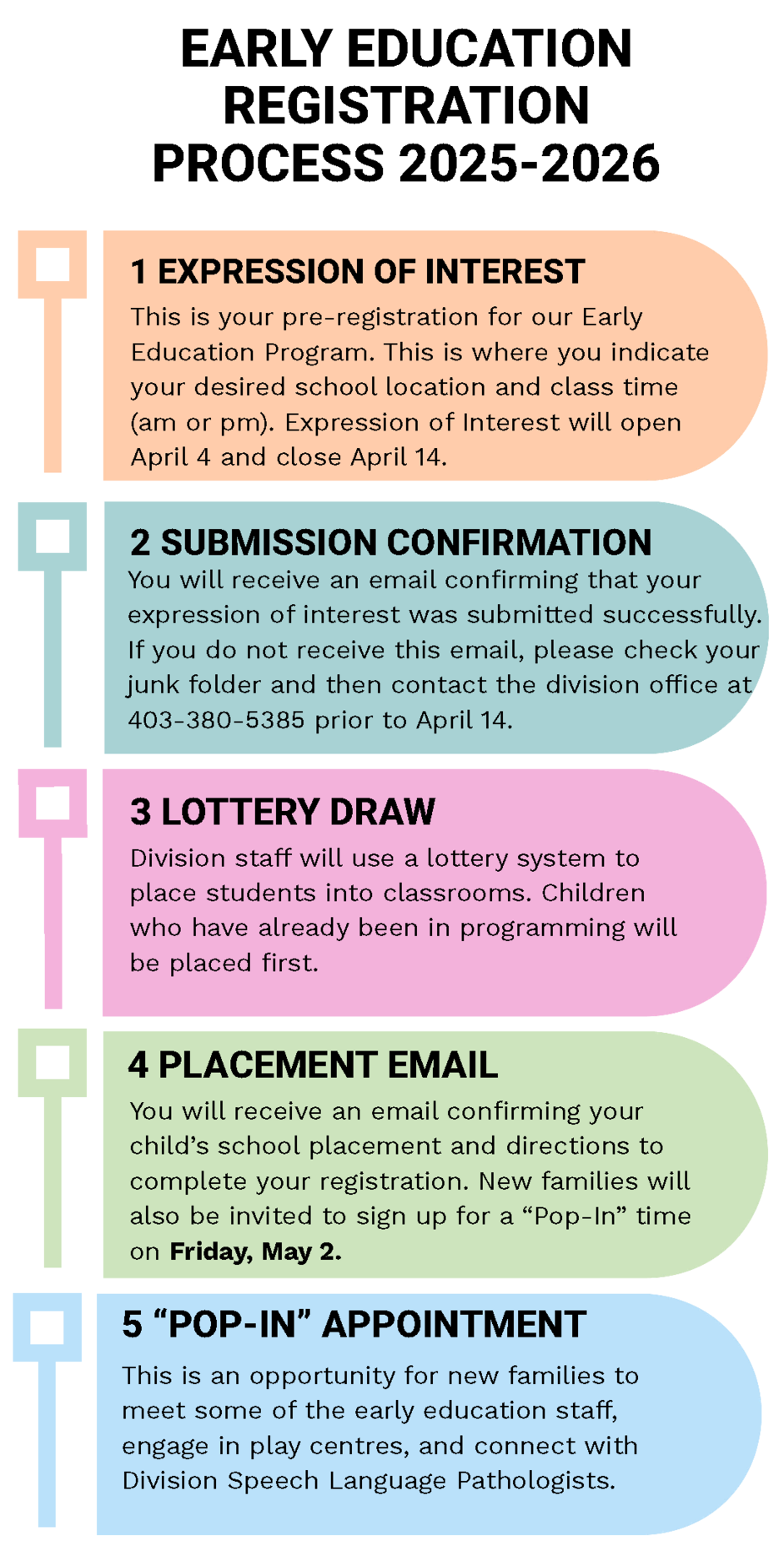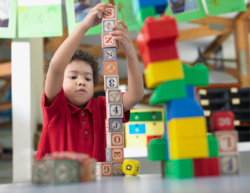2025/2026 Early Education Program (EEP)

Thank you for considering Lethbridge School Division’s Early Education Program for your child!
Lethbridge School Division Early Education Program continues to accept pre-registration for children who are four years old by December 31, 2025. Children that are three by December 31, with a moderate language delay or severe developmental delay, meeting Alberta Education criteria, are also accepted where space is available. Please use the link below to add your child to the pre-registration list. Please note, there are limited spaces available in programs. Your child will be placed if there is space remaining in the program. There is a $200 monthly fee. Children with assessed developmental needs that meet Alberta Education criteria may be eligible for programming without monthly fees.
Early Education Program Pre-Registration Sign-up
If space is available in June, children who are three years old without an identified delay may be placed in an Early Education Program. Please use the link below to add your child's name and information to the waitlist.
2025/2026 Early Education Program (EEP) Registration

An expression of interest process (pre-registration) for Lethbridge School Division's Early Education Program will take place between April 4-14, 2025. A lottery will be held to determine the placement of students, and families will be notified regarding the results.
Early Education Programs in the Division focus on supporting children with identified needs, who meet the Alberta Education criteria for support in programming. Limited additional spaces will then be open to the public as they are available. Additional spaces for students without identified needs do require a $200 monthly fee.
Families may complete an expression of interest (pre-registration) for children who are four years old by Dec. 31, 2025. Children that are three years old by Dec. 31, 2025, experiencing a moderate language delay or severe developmental delay that meets Alberta Education criteria may also be accepted. If available, additional spaces for three-year-olds will be open to the public in June and require a fee. This information will be posted to the Division's EEP website in June.
Expected program locations for 2025/2026 are being determined and will be added to the website when finalized.
Children who are currently attending a Lethbridge School Division Early Education Program (as of April 1, 2025) will be placed first.
Children 3 to 6 Years of Age
Learning starts the moment a child is born. The first six years of a child’s life are an extremely important time in their development. It is a critical time in human development when the brain is developing connections faster than at any other time in a person’s life. Strong brain foundations are critical to support future learning and life success.

Alberta Education, within the Inclusive Education framework, has identified that every child deserves a great start. Lethbridge School Division values and supports the best possible start in a child’s learning journey and life success by providing Early Childhood Services programming that is based on current research in the field of early learning and development.
Early Childhood Services (ECS) in our school district refers to programs that meet the developmental and identified needs of families of young children (ages 3 to 6 yrs.). In some circumstances, children identified with severe delays may start as early as 2 years 8 months. The education of children in the year prior to Grade 1 is referred to as Kindergarten. Kindergarten Programs are an important part of ECS and FREE Kindergarten Programs are available to ALL children. Fees are applicable for entry into our Early Education Programs since these are not government funded programs, other than children with assessed development delays that meet Alberta Education criteria.
Children who have identified delays access integrated supports that may include involvement of a Speech Language Pathologist, Occupational Therapist, Physiotherapist, Behavioural Consultant, Psychologist, Vision Consultant, Hearing Consultant etc., depending on their area(s) of need. An Individual Program Plan (IPP) is developed by the team which includes the parents, classroom staff and support professionals.
Guiding Principles for Our Early Education Programs
- Experiences during early childhood years are crucial to a child’s learning and development.
- A safe and caring environment is necessary for learning.
- Children learn through play and exploration.
- Staff and families work as partners to support a child’s development.
- A team approach is used to address all areas of a child’s development.
- Active involvement in meaningful learning experiences includes challenges and successes.
- Meeting all children and families, where they are currently at, is critical.
- Decision making and responsibilities are shared.
- Children learn and reflect what they know in different ways.
- Children’s needs are identified early and proactive steps are taken to address potential delays or challenges.
- Our early education programs are ready to accommodate all children and adapt programs to ensure learning and success for all.
Early Education Programs for Preschool-aged Children
Lethbridge School Division offers Early Education Programs that are developed on a hands-on, play-based, developmentally appropriate approach that recognizes that children learn from one another as well as responsive adults. Our programs provide a strong foundation in speech and language skills, as well as other areas of development, that allow children to learn alongside their peers. Children gain independence through proactive support and planning.
Parents may register children for an Early Education Program if they are four years old by Dec. 31 of the school year they are entering. Children that are three by Dec. 31, experiencing a severe developmental delay that meets Alberta Education criteria, are also accepted. Children are required to be fully toilet trained with some exceptions made for children with identified delays or medical needs. For the 2025/2026 school year we will offer programs in 7 locations: Fleetwood-Bawden Elementary School, Galbraith Elementary School, Park Meadows Elementary School, Westminster Elementary School, Dr. Gerald B. Probe Elementary School, Nicholas Sheran Elementary School and Mike Mountain Horse Elementary School.
The Early Education Program Brochure for 2025/2026 can be found here:
The Early Education Handbook can be found here:
Parent Resources for the Early Education Program can be found here:
Early Education Tips can be found here:
For 2025/2026, the locations for EEP are still being determined. For the 2024/2025 school year, EEP locations included:
Southside:
Fleetwood-Bawden Elementary School
Northside:
Galbraith Elementary School
Park Meadows Elementary School (a.m. class only)
Westminster Elementary School (p.m. class only)
Westside:
Dr. Probe Elementary School (a.m. class only)
Nicholas Sheran Elementary School (p.m. class only)
Mike Mountain Horse Elementary School
- For further information you may contact Kathy Knelsen at 403-380-5385
Parent Information and Community Resources
Child Development
Core Story on Brain Development
Centre on the Developing Child – Harvard University
Talk Box – A Resource for Speech and Language Development
Hanen Tips for Parents - Language and Literacy
Healthy Parents – Healthy Children
Triple P (Positive Parenting Program)
Galileo Network – Early Learning – Parent Info
Community Resources
Children’s Allied Health Services – Lethbridge and Area
Community Links – Southern Alberta
Alberta Education – Early Childhood
My Child’s Learning – A Parent Resource – Kindergarten
Provincial Early Childhood Initiatives
Together We Raise Tomorrow – An Alberta Approach to Early Childhood Development
Let’s Talk About the Early Years – Early Childhood Development Report by the Chief Medical Officer of Health Alberta
National Early Childhood Initiatives
Council of Ministers of Education Canada – Statement on Play-based Learning











